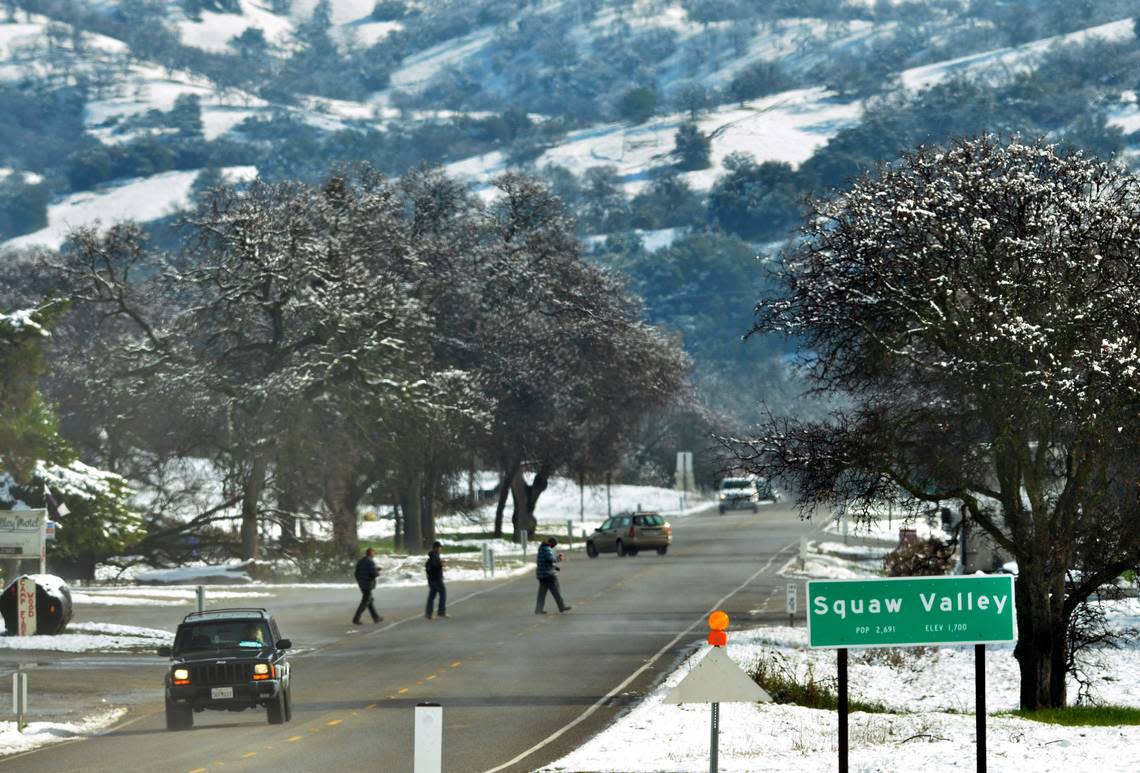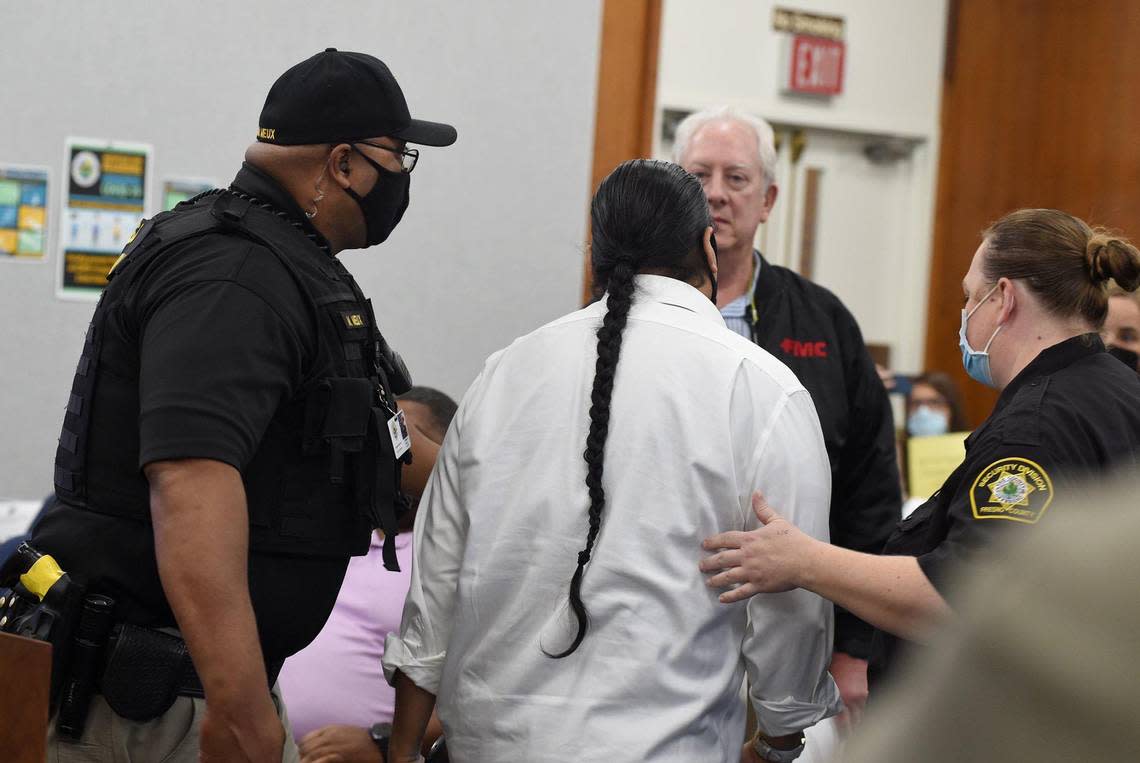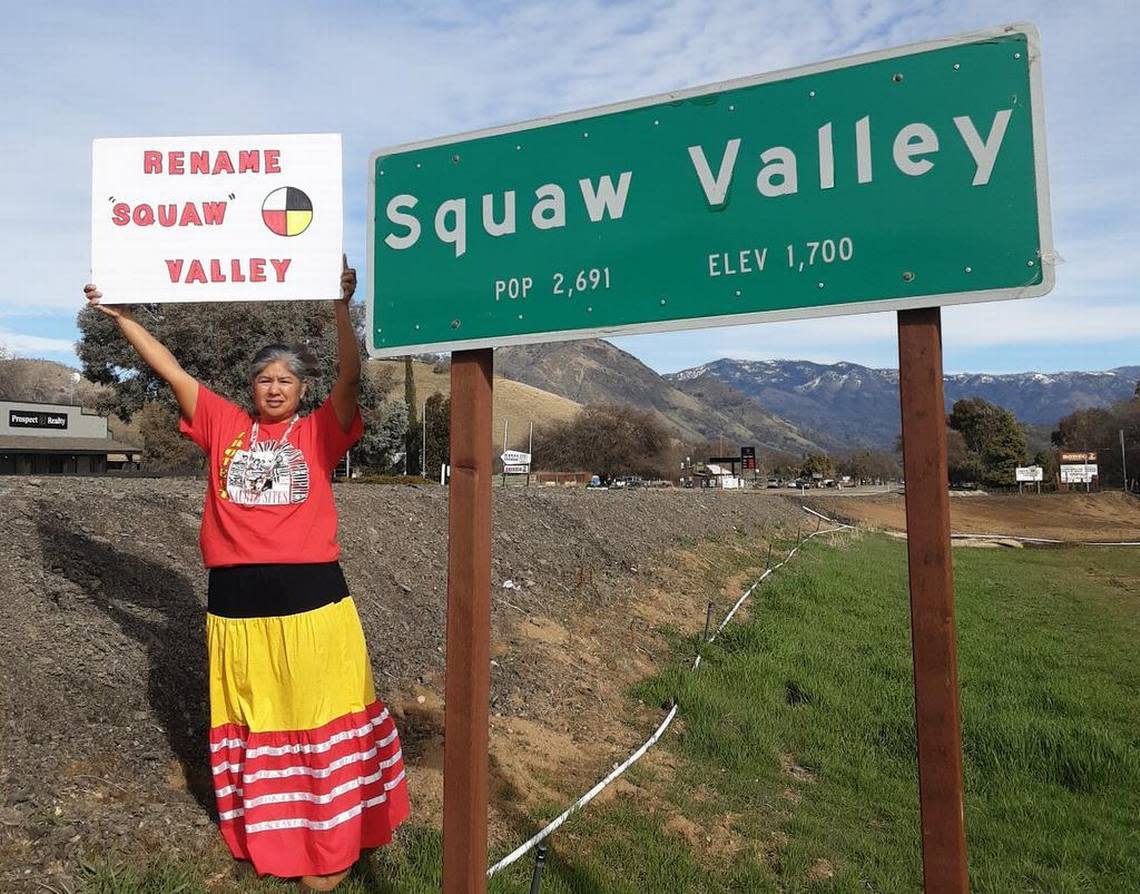Hundreds of places have removed ‘squaw’ from name. Why not the town in Fresno County?
The rural town of Squaw Valley in eastern Fresno County is now facing federal, state and local efforts to change its name as part of a national push to remove the word “squaw” from places across the United States.
The Department of the Interior, in announcing it removed the word from nearly 650 geographic features, last week called it “an offensive ethnic, racial and sexist slur,” particularly for indigenous women. It’s now widely considered so derogatory that the Interior Department only referred to it as “Sq_” in its news release.
At the state level, California legislators passed AB 2022 last month, a bill that requires the word be removed from places across the state by Jan. 1, 2025. It now awaits a signature from Gov. Gavin Newsom, what some speculate could come on Sept. 23, California Native American Day. The state also expanded its work assessing place names a couple years ago through the California Advisory Committee on Geographic Names and California Natural Resources Agency.
At the local level, Roman Rain Tree, a Native American man from the area, started a campaign to rename the town in 2020, including a petition that’s received over 36,500 signatures.
Despite all these forces at work, the town of Squaw Valley — an unincorporated community without a city council, population 3,564 at the last count — remains Squaw Valley, at least for now. It sits along Highway 180, en route to an entrance of Sequoia & Kings Canyon National Parks.

Its representative, Fresno County Supervisor Nathan Magsig, has discussed the issue during some of his regular Facebook Live updates but has otherwise largely stayed out of it, seeing the issue as Rain Tree’s project. Magsig asked Newsom to veto AB 2022, stating Squaw Valley residents have been left out of discussions, what Rain Tree disputes.
The California bill could force the town’s name to change, as could an effort still underway by the U.S Board on Geographic Names. The board is doing an “additional review” of seven unincorporated populated places, including Squaw Valley, because there are “unique concerns” regarding those places being renamed.
The Interior Department said the board will seek more information “from the local communities and stakeholders before making a final determination,” without explaining how or when. Magsig said that federal board reached out to him for the first time on Thursday to send a packet of information about Squaw Valley.
There was a public comment period earlier this year about efforts to rename “squaw” place names, led by a task force created by the Interior Department. Magsig said Thursday that he was unaware of it and the Bee story’s announcing that public comment period.
The next day, he said in a Facebook Live update on Friday that he was “working right now to figure out a process where people who live in Squaw Valley can have an opportunity to weigh in and share what they want to do for their region, even if it means attempting to keep that name.”
New Sierra names above central San Joaquin Valley
The Board on Geographic Names renamed six physical features last week in the Sierra foothills and mountains above the central San Joaquin Valley. Among the changes: The physical basin of Squaw Valley is now Yokuts Valley. That’s also Rename Sq**w Valley Fresno County’s preferred new name for the town.
Yokuts is a regional description for American Indians that encompasses many traditional tribes.
Two other places, in far eastern Fresno County, received new American Indian names. Giovanni Rocco, a spokesperson for Interior Secretary Deb Haaland’s office, shared the following translations:
Tubbe Paa Lake: Northern Paiute language. English translation: Rock Water Lake. (The place’s name was Old Squaw Lake.)
Nüümü Hu Hupi: Paiute language. English translation: Paiute Woman Lake. (The place’s name was Squaw Lake.)
The words bear resemblance to some used in the western foothills, too.
“Paiute and Mono are very similar, sister languages,” said Carly Tex, executive director of Advocates for Indigenous California Language Survival and a member of the North Fork Rancheria of Mono Indians.
Nearly 70 tribal governments participated in consultations for new U.S. names.
Attempts to be heard: The quest for a public meeting
Rain Tree and others have asked Magsig to do more to help them.
A point of contention: That a public meeting hasn’t been held in Squaw Valley about the proposal to remain the town, what many asked Magsig to lead.
The only public building available to host such a meeting in the small town of Squaw Valley is an activity center attached to Bear Mountain Library, a branch of the Fresno County Public Library system.
Rain Tree said he asked to use the room to host a town hall meeting about the issue last year, and again more recently to host an educational meeting about Yokuts, and was denied both times. He said the first time he was told the issue was too political, and the second time, that he was unqualified to lead such a meeting.
Rain Tree identifies as a member of the Dunlap Band of Mono Indians, Choinumni and Wukchumni tribes, and said he’s also related to the Wuksachi tribe.

Jennifer Bethel, principal librarian for the Fresno County Public Library and its division manager of community engagement, said the Bear Mountain Activity Center meeting room is “a bit unique.” Unlike other library rooms – which are reservable on the library’s website, and directly managed by library staff – applications to use the room in Squaw Valley are forwarded to the Bear Mountain Activity Center Advisory Board, which is the entity that approves or denies the use of that room.
The chairperson of that advisory board has not responded to The Bee’s requests for comments about the denials.
Magsig said he recently reached out to staff there, asking them to allow Rain Tree to host a meeting at the center, and also gave Rain Tree available dates.
Rain Tree said he thinks organizing such a meeting is now clearly Magsig’s responsibility, given the federal, state and local efforts underway to change the name.
“It’s time ... the writing’s on the wall,” Rain Tree said.
Rain Tree has been unsuccessful in trying to get the issue onto a Fresno County meeting agenda. During a Fresno County Board of Supervisors meeting in November, Rain Tree turned his back to supervisors when he spoke during the public comment period, saying that’s how he felt the board was treating him and others. In response, Board President Steve Brandau said, “Get this guy out of here,” and had Rain Tree escorted out of the meeting.

Rain Tree said he and members of his grassroots coalition have been talking with community members, including through a Facebook page, about the renaming proposal, but that he doesn’t have the staff or time now to lead a meeting in Squaw Valley. If there was a time for him to lead one, it was last year, he added. COVID-19 has also been a concern. Rain Tree’s father died from COVID last year.
The renaming proposal has been a hot-button issue for Magsig since Rain Tree tried to get the city council of Orange Cove near Squaw Valley to vote on a resolution about its renaming early last year. Rain Tree said he was only trying to get support for the renaming campaign and knew the city didn’t have the authority to change the name.
Of AB 2022, now awaiting the governor’s signature, Magsig said during an Aug. 25 Facebook Live update, “If there is to be a name change, it needs to be driven at the local level, by the residents who live in Squaw Valley” – without acknowledging the renaming campaign led by Rain Tree, who grew up there and still has family there.
“I always get a little concerned when elected officials both at the federal level and state level try to tell us at the local level how we need to think, how we need to act, what’s offensive, and what’s appropriate,” Magsig continued, “because at the end of the day, all it means is more and more of our freedoms are taken away.”
Assemblymember Joaquin Arambula, D-Fresno, coauthored AB 2022.
“I have met with Mr. Rain Tree about this issue, and I wanted to coauthor the bill because it simply is time to change the name,” Arambula told The Bee in February. “The word is a debasing term against Indigenous women, and it is degrading every time it is uttered or shown on a sign.”
Places in the Fresno County town that would be affected by the state legislation include a school, ambulance and fire stations, a cemetery and a post office.
Native American input about proposed name change
Rain Tree’s mother is from Squaw Valley. He spent summers there at his grandparents’ home. His motivation to change the town’s name stems from wanting to protect his female family members, including his young daughter, as the number of murdered and missing indigenous women across the U.S. continues to grow.
“European American men on horseback would chase my grandmother and her friends, calling them the s-word,” Rain Tree said of their experiences in Squaw Valley. “Their intentions of what they would do had they captured my grandmother and her sisters was clear. They were regularly sexually harassed and terrorized while being called the s-word to the point that they had a pre-established route to a safe meeting point for when they were being chased.”
Rain Tree now lives in Fresno.
“I don’t live in Yokuts Valley because all of it is stolen land,” Rain Tree said, “170 years of broken treaties. We didn’t leave our ancestral homeland, we fled for survival, during a time when America didn’t care if anyone was offended by the s-word. But times have changed for the better and so has America.”
The Board on Geographic names said it’s required to ask all 574 federally-recognized tribes for input about name changes. But most tribes that called Squaw Valley home are not federally recognized, and finding their leaders can be difficult.
AB 2022 would require non-federally recognized tribes listed by the California Native American Heritage Commission be consulted about name changes, too. The commission’s list of tribes is self-reported by California tribes.
One of the most organized and active of the tribes without federal recognition in the Squaw Valley area is the Dunlap Band of Mono Indians. Shirley Guevara — speaking to The Bee previously as an individual, instead of for the tribe as a whole in her role as vice chairperson — said “squaw” has always been an offensive word, and that it’s as offensive as the N-word is to African Americans. Some others have said that it doesn’t bother them.

Squaw is a slur to many Native Americans. They want a Fresno County town renamed
“All the tribes in the area have refrained from any public comment, but the chairs have expressed support as an individual resident,” said Rain Tree of his renaming campaign, adding that he thinks it’s because they’re worried about jeopardizing petitions for federal acknowledgment.
Magsig pointed out during a recent Facebook Live that he heard there’s a group that refers to themselves as the “Squaw Valley Tribe or the Squaw Valley Band of Wuksachi Indians,” and questioned whether the government would make them change their name, too.
That name is not listed by the California Native American Heritage Commission, or online as a petition before the Bureau of Indian Affairs, however.
Rain Tree said he found a reference to the Squaw Valley Tribe in a document online, but otherwise had not heard of that group, and only found one person who had heard of it. Nonetheless, he initially included the “Squaw Valley Tribe” in a list of people and groups that he addressed his change.org petition to, hoping a representative would come forward if it existed. He said no one ever did, and he removed that name from his petition because it was causing confusion. He thinks the name could also be a case of indigenous people taking on the name of their location, like the band in Dunlap.
Much of Rain Tree’s attention has turned to preparing for a Dec. 10 event about human rights and indigenous people at Fresno State, and trying to increase awareness about how many tribes petitions for federal recognition have been under review for decades. Their plight is tied to 18 unratified treaties with at least 119 California tribes that legislators dismissed and placed in a secret file in 1852, recounted in “An American Genocide: The United States and the California Indian Catastrophe, 1846-1873,” written by an associate professor of history at UCLA.
Rain Tree’s wife, Rieka, is currently working on a short film related to that issue for CMAC’s The Big Tell film festival in Fresno this November, what Rain Tree hopes to build upon.
He thinks renaming Squaw Valley to Yokuts Valley could also help support some area tribes petitioning for federal recognition.
“I feel like it’s a good place to start,” Rain Tree said, “to start to engage people about other plights that are devastating to our community.”
